- Home
- Vince Flynn
The Survivor Page 24
The Survivor Read online
Page 24
He could hear them arguing and used the time to ponder his strategy. The handgun was hardly an appropriate weapon when faced with a truckload of armed men. He had an AK-47, but even that would leave a great deal to chance. Certainly, he would kill or wound a number of them, but the rest would take up positions across the street and in the stairwell leading to his apartment. He would be trapped.
Finally, he selected a grenade. It was reported to have a seven-second delay and he wondered how accurate that was. The Americans were normally quite precise about such things but it didn’t really matter. He didn’t own a watch.
Hotaki pulled the pin and began counting. What was the word the Americans used when they did this? It was one of their states. Mississippi. Yes, that was it.
When he got to seven, he held the grenade out the window and let go.
Allah, in his infinite mercy, decided to smile on him. The explosive detonated just after Hotaki withdrew his hand behind the safety of the wall. It sent shrapnel raining down on the vehicle and the men in it, as well as disintegrating part of the window’s upper frame in a cloud of eye-stinging dust and smoke. Beyond being entirely deaf—a relatively trivial problem since it was unlikely he would survive another five minutes—Hotaki was completely unharmed.
He heard the spinning of tires on the south side of the street and threw himself out of the window. It was a three-meter drop, but the bodies in the truck’s bed provided a comfortable landing. He immediately leapt to the ground, pulling open the driver’s door and dragging the man from behind the wheel. He was bleeding badly from his head and neck as a result of shrapnel that had penetrated the roof. Hotaki slid into the seat and shoved the accelerator to the floor. The vehicle fishtailed into the road as the other pickup closed from behind.
The man in the passenger seat next to him suddenly regained consciousness and began asking what had happened in a panicked voice. He’d been blinded by the grenade and had no idea that his comrade was choking to death in the road behind them.
Hotaki leaned across and threw open the passenger-side door. He swung close to a cart full of hand-hewn cooking utensils and pushed the Taliban fighter out as they passed. The door caught the edge of the cart and nearly severed the man’s legs as he fell to the street. The door was ruined, so Hotaki used the side of a building to shear it the rest of the way off.
Automatic gunfire started behind him, and Hotaki swerved around a tight corner before skidding to a stop. He adjusted the mirror and pressed himself back into the seat, bracing himself as he waited.
A few seconds later, the pickup chasing him came drifting around the corner. The driver, focused on aiming a submachine gun through his open window, realized too late that Hotaki was stopped in the road.
The impact felt less powerful than expected, probably due to the considerable weight of the bodies in the back. His vehicle was propelled forward a few meters, and he gripped the wheel as two men flew over the top of him and landed in the road.
Hotaki depressed the accelerator again, swerving in a lazy S pattern to run over the men as they tried to shake off the impact and rise to their feet. He hoped Allah would forgive him the intense pleasure he felt as they were pulled beneath his wheels.
CHAPTER 43
CIA HEADQUARTERS
LANGLEY, VIRGINIA
U.S.A.
IRENE Kennedy followed as Nash weaved confidently through the maze of cubicles. She’d never been in this part of the building and its inhabitants’ faces reflected that. At first, expressions ranged from mild shock to outright fear. By the time she neared the back wall, though, word had spread. Every head was down, focused on computer screens, phones, or whatever documents were at hand.
Apparently Marcus Dumond was starting to be affected by the pressure of the job he’d been tasked with and Nash felt that dragging him up to the seventh floor would make matters worse. The hope was that Dumond would be more relaxed on his home turf.
The office was what she’d expected—indeed what he’d asked for when he’d signed on. Nearly as big as hers but windowless, it looked a bit like a garage sale right before the doors opened. There was nothing that even vaguely resembled office furniture. Paper files and books were stacked on a sagging Ping-Pong table, vintage La-Z-Boys provided seating, and there was an unmade twin bed beneath a Washington Redskins poster in the corner. Mitch Rapp was sitting on a threadbare sofa next to what appeared to be a week’s worth of dirty clothes.
He didn’t look up from the Sports Illustrated he was reading when they entered. Dumond, on the other hand, jumped to attention and began tossing stuff off a recliner centered in the room.
“That’s all right,” Kennedy said. “I can stand.”
“Are you sure?”
She nodded. “I’m told you’ve come up with a plan, Marcus.”
“I guess. I mean, yes . . . I have.”
She was glad she hadn’t insisted on him coming upstairs. Nash was right. She’d seen the young computer genius nervous before, but the deer-in-the-headlights look in his eyes was new.
“I’m anxious to hear it. You know we have nothing but confidence in you, right, Marcus?”
“Yeah. . . . Thanks,” he said before falling silent.
“Come on, big guy,” Nash prompted. “It’s a great idea. Tell Irene just like you told me.”
“Okay. I still have friends who are . . . well, hackers. I mean, I don’t do any of that stuff anymore. No way. But I’ve stayed in touch with a few people from back in the day.” His gaze fell to the floor. “You know. Here and there.”
Kennedy just smiled blandly. It was an outrageous lie. Just last week, Dumond and a few of these friends had broken into the Walt Disney Studios site and replaced the new Star Wars trailer with a vulgar—but beautifully produced—interpretation of their own.
As long as it was harmless fun and he covered his tracks, Kennedy wasn’t inclined to intervene. In a way, the competition and cooperation with other hackers helped keep his skills sharp. While people on her end of the spy business tended to benefit from their years of experience, time worked against the tech gurus.
Dumond’s comment got more of a reaction from Rapp, who finally looked over the top of his magazine. “Loved the Star Wars video, asshole.”
The young man froze. “You know about that?”
Rapp scowled and went back to his article. “Are we going to do this anytime this year?”
Nash leaned into Dumond and spoke reassuringly in his ear. The hacker gave a few jerky nods and continued.
“Rickman needed someone to send his files to the Russians or the Iranians, or whoever, right? He’d have to find someone good enough to cover their tracks, and since they’d have to decrypt the data first, they’d also have to be kind of lunatic fringe. Crooked enough not to care that the stuff they’re handling could get people killed and nuts enough to not care about pissing off the CIA.”
“Your point?” Rapp said.
“It’s a pretty short list—people smart enough to have a chance of keeping me off them and big enough jerks to get involved.”
“Do we have that list?” Kennedy asked.
He slipped a piece of paper from his back pocket and carefully unfolded it. Kennedy took the damp page and scanned down it. “There must be fifty names here. And probably thirty nationalities.”
“Yeah. But it’s better than seven billion names, which is what we’ve got now.”
“So let’s say our guy is on that list,” Rapp said, putting down his magazine. “How do we narrow it down?”
“I send out a phishing email.”
Rapp’s suspicion of technology had made him somewhat ignorant of it. In his mind, it was better to just stay away from things that evolved on an hourly schedule and could be grasped only by teenagers.
“Like the ones you get pretending to be your bank and asking for your password?”
“Exactly. We’d send a file from that Italian law firm’s server to -everyone on the list. The guy we’re looking for would
try to decrypt it, but I’d make it so it comes up corrupted. Whoever responds and asks for us to resend it is the person we’re looking for.”
“And you’d be able to trace that email?”
“If I’m ready for it and you were serious about giving me access to a whole lot of the NSA’s bandwidth, yeah. I can trace it.”
Kennedy was the first to raise an objection. “Fifty seems like a lot, Marcus. You hackers communicate, don’t you? In private chat rooms and forums? Isn’t it likely that someone will mention getting this email? And that other people will say they did, too? Won’t that raise suspicions?”
“It’s definitely a risk. But it’s the best thing I can come up with.”
“Why can’t we narrow it down?” Rapp said.
Everyone looked over at him. “How?” Nash asked.
“Rick would pick the best one.”
“I agree,” Kennedy said. “But that’s a subjective concept. What’s ‘best’?”
Rapp stood and took the list from her, spreading it out on the Ping-Pong table before motioning Dumond over. “Rick never made a move without knowing all the angles. He researched everything to death and had more contacts in more places than anyone in the Agency.”
“I don’t understand what you’re getting at,” Dumond said.
“How many of these people are you friends with or have you collaborated with in the past? Rick would know we’d give you the lead on this, so it seems pretty unlikely that he’d hand the job to someone you’re close to. Mark off all your friends.”
“Hey, Mitch . . . like I told you, the people on this list are pretty bent. I wouldn’t hang out with guys who’d do something like this.”
Rapp turned toward Dumond and the hacker again let his eyes drift to the floor.
“Look at me, Marcus.”
“Mitch, I—”
“You know what kind of people I deal with every day?”
“Yeah, I guess,” he mumbled.
“Then you’ll believe me when I say that I couldn’t give a fuck about a bunch of people running around stealing credit card numbers. What I care about—all I care about—is you putting me in front of this guy.”
Dumond reluctantly pulled out a pen and began marking through names. It turned out to be more than Rapp would have guessed. When he was finished, there were only about twenty names left.
“Mitch is right,” Kennedy said. “But let’s take it one step further. How many of the remaining people have you hurt, Marcus? Blocked, stolen from, or made look foolish? How many hate you enough that they’d fight you every step if you ever tried to get to them?”
He scanned through the list. “Maybe four.”
Rapp tapped the page with his index finger. “Then that’s where we start.”
• • •
Rapp followed Irene Kennedy into her office and closed the door behind him.
“What do you want to talk to me about?”
Normally Rapp avoided headquarters like the plague, and that day he’d been forced to take the full tour—public elevators, the basement, and more crowded hallways than he could count. As a man who valued anonymity beyond all other things, being gawked at and backslapped by half the Agency wasn’t going down well.
“Please have a seat.”
He would have preferred to stay close to the door, but there was a weight to Kennedy’s tone that suggested the meeting was going to be neither quick nor easy.
“What is it?” he said, doing as she asked.
“I have a meeting with the president scheduled for later this afternoon.”
“Let me guess. Kamal Safavi?”
Tensions between the United States and the Iranians continued to escalate, with accusations being flung from both sides. Tehran had completely shut down diplomatic relations, and President Alexander was talking about a new round of sanctions. In the meantime, the fledgling cooperation between the two countries with regard to controlling the Sunnis was dead in the water.
“Iran’s one item on the agenda.”
“What are the others?”
“The Russians. Fahran Hotaki. The fact that someone has the Rickman files and there’s no way for us to be certain they haven’t accessed them. What Rick knew and how he got that information . . .” Her voice trailed off.
Rapp didn’t envy her. There was nothing politicians liked to do more than Monday morning quarterback decisions that they themselves wouldn’t have the guts to make. As long as things were going well and they were getting reelected, they were content to stay in the background. But when things got tough, they didn’t just abandon the sinking ship, they drilled holes in the hull on their way out.
“Is that all?”
“No. I assume the subject of my resignation will come up.”
“You’ve got to be kidding.”
“I’m afraid not. We had a lot of history with President Hayes, but the situation with Alexander is completely different. He wants to do the right thing but at some point politics wins.”
“So we have the walls coming down around us and they’re going to install some political hack to make it look like they’re reining us in? If he gets in my way, Irene, I swear I’ll put a bullet in the back of his head.”
“I wish you wouldn’t say things like that.”
“I’m not joking. If anyone tries to stop me from turning this situation around, they’re going to have serious problems. The choice between some wound-up bureaucrat and one of our guys in the field is pretty easy for me.”
“I think we can avoid it coming to that. With all the gridlock and posturing that goes along with getting a new director confirmed, a temporary head of the Agency will have to be named. I think the president will strongly consider any recommendation I make.”
“I feel like you’re giving up too easily, Irene. You almost sound okay with this.”
“I’m not giving up, but there’s blood in the water and I’ve made more than my share of enemies in Washington. It would be stupid for me to go to this meeting unprepared for the president to ask me to step down.”
“Who then?”
“You’re too controversial and I assume you wouldn’t take the job anyway.”
“I’d rather put a gun in my mouth.”
“Then Mike Nash.”
Rapp didn’t respond, instead leaning back in his chair and staring past Kennedy through the window behind her.
“He’s the American hero you insisted on making him, Mitch. Any politician who takes a stand against him will run a serious public relations risk.”
While Rapp wasn’t exactly enthusiastic about the idea, Kennedy was likely right. Nash had the resume, and despite a tendency toward moral paralysis, he was no coward. When it came time for things to get bloody, he could be counted on to be there.
“Mike wouldn’t be permanent and I don’t think he or anyone in Washington would want him to be,” Kennedy continued. “The goal here is to put someone in my chair who can keep the politicians off your back long enough for you to resolve the Rickman problem.”
Rapp still didn’t respond.
“Mitch? I need you to say something. If you can’t work with him—technically for him—you have to tell me who you’d prefer.”
“Fine.”
“What does that mean?”
“It means that I might have to knock him on his ass a couple of times, but I can work with him.”
“For him,” she repeated.
“I said fine.”
She was visibly relieved. “Like I said, I hope it won’t come to that, but we have to be ready.”
“Yeah,” Rapp said, trying to swallow his anger. Putting Irene Kennedy out on the street with everything that was going on would be unimaginably stupid. The problem was that unimaginably stupid had become a job requirement in Washington.
CHAPTER 44
CENTRAL AFGHANISTAN
IT was good to be out of the city.
The air blowing through the missing door was still hot despite the sunset fiftee
n minutes before. Dust rising from the road swirled inside the cab, attacking Fahran Hotaki’s eyes and working its way into his mouth, but it didn’t bother him. In fact, he found it strangely nostalgic. A reminder of his life before the war. Of days spent tending livestock and raising children.
He had no photos of his village or his family. Cameras, as well as phones and computers, had been of little use to him then. They’d become part of his life only after he’d joined the fighting.
Living a life cut off from the outside world was appealing in so many ways. The unchanging rhythm of it, the intimate familiarity with everything that made up his universe. He’d known nothing of economic swings, the Internet, or nuclear weapons. Nothing of tensions between nations, pandemics, or environmental disasters. There had been only him, his people, and the vast, empty land around them.
It was a level of simplicity that should have been easy to preserve—one that would make his country of little interest to outside forces. For some reason, though, Afghanistan could never just retreat into its primitive, insular culture.
Would-be conquerors had come in seemingly endless waves since the dawn of history. In his lifetime, Afghanistan had endured the Russians, the Taliban, countless foreign terrorist groups, and now the Americans.
Why would Allah not let this rocky corner of the planet exist in peace? Why must there be constant tests of His people’s faith? How many horrors would God force them to suffer before He was convinced of their devotion?
“Allahu akbar,” Hotaki said over the whistle of the wind. His growing habit of questioning the god he would be meeting later that night was the height of arrogance. Still, he hoped there would be some kind of explanation. He wanted so badly to understand.
The stars were beginning to ignite and he glanced down at the truck’s gas gauge while there was still sufficient light. Less than a quarter of a tank. He could extend the pickup’s range by emptying the bodies from the bed, but it was unnecessary. There would be no return trip.

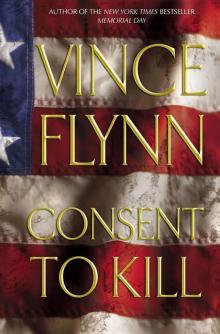 Consent to Kill
Consent to Kill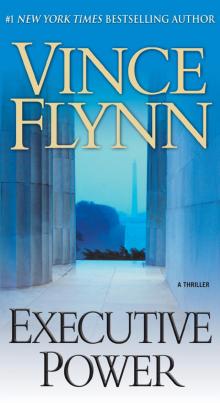 Executive Power
Executive Power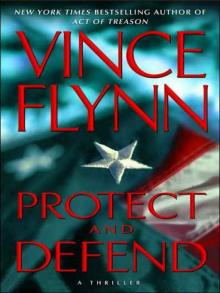 Protect and Defend
Protect and Defend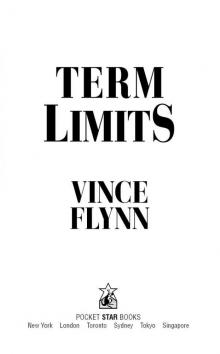 Term Limits
Term Limits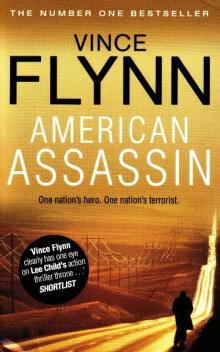 American Assassin
American Assassin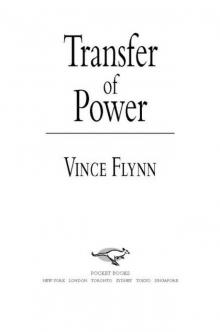 Transfer of Power
Transfer of Power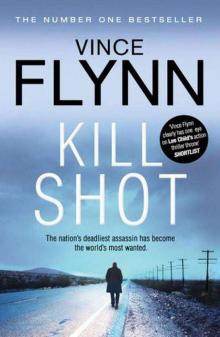 Kill Shot
Kill Shot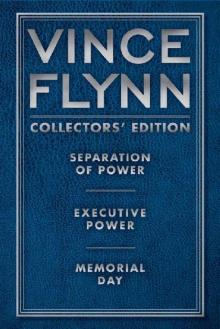 Vince Flynn Collectors' Edition 2
Vince Flynn Collectors' Edition 2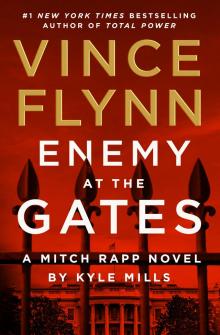 Enemy at the Gates
Enemy at the Gates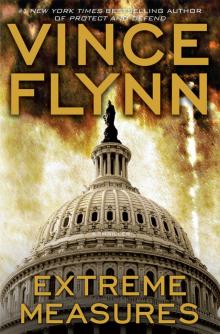 Extreme Measures
Extreme Measures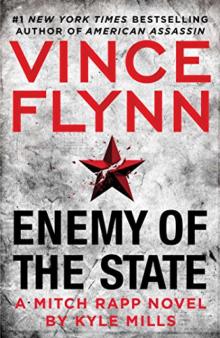 Enemy of the State
Enemy of the State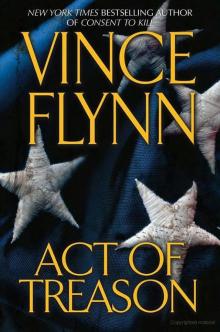 Act of Treason
Act of Treason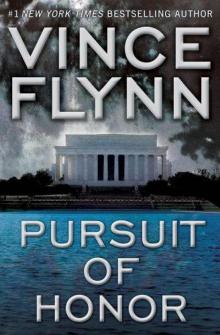 Pursuit of Honor
Pursuit of Honor The Survivor
The Survivor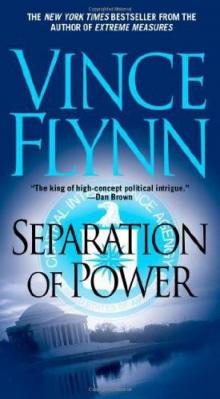 Separation of Power
Separation of Power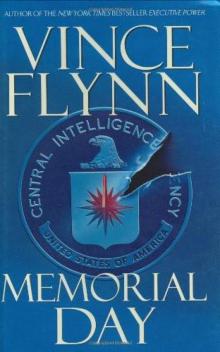 Memorial Day
Memorial Day The Last Man
The Last Man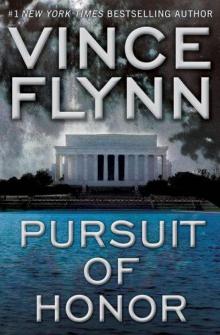 Pursuit of Honor_A Thriller
Pursuit of Honor_A Thriller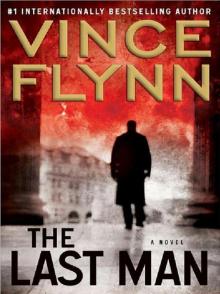 Mitch Rapp 13 - The Last Man
Mitch Rapp 13 - The Last Man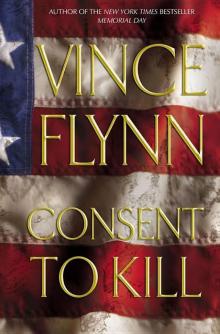 Consent to Kill:
Consent to Kill: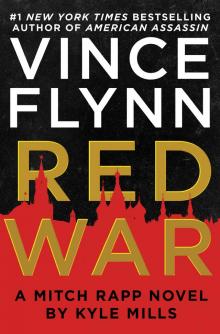 Red War
Red War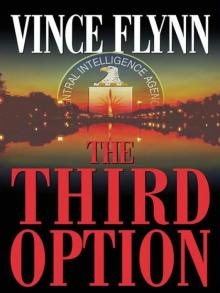 Mitch Rapp 02 - The Third Option
Mitch Rapp 02 - The Third Option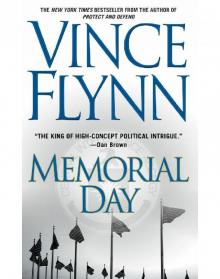 Mitch Rapp 05 - Memorial Day
Mitch Rapp 05 - Memorial Day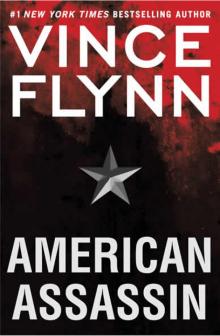 Mitch Rapp 11 - American Assassin
Mitch Rapp 11 - American Assassin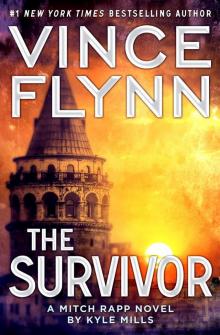 Mitch Rapp 14 - The Survivor
Mitch Rapp 14 - The Survivor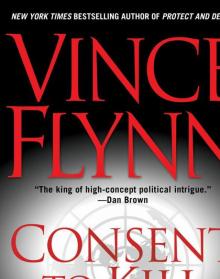 Mitch Rapp 06 - Consent to Kill
Mitch Rapp 06 - Consent to Kill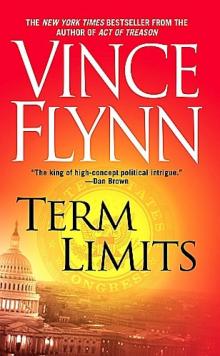 Term Limits mr-1
Term Limits mr-1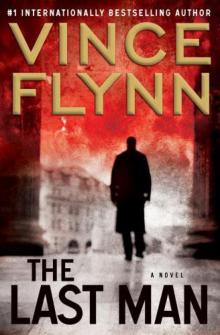 The Last Man mr-13
The Last Man mr-13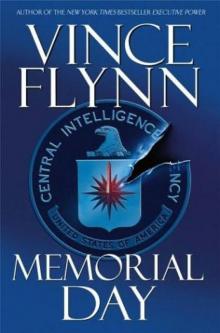 Memorial Day mr-5
Memorial Day mr-5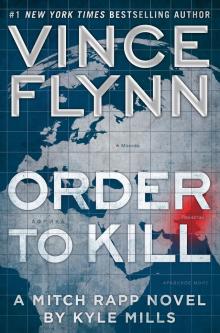 Order to Kill
Order to Kill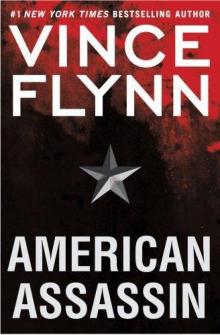 American Assassin: A Thriller
American Assassin: A Thriller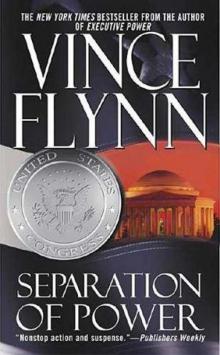 Separation of Power mr-3
Separation of Power mr-3